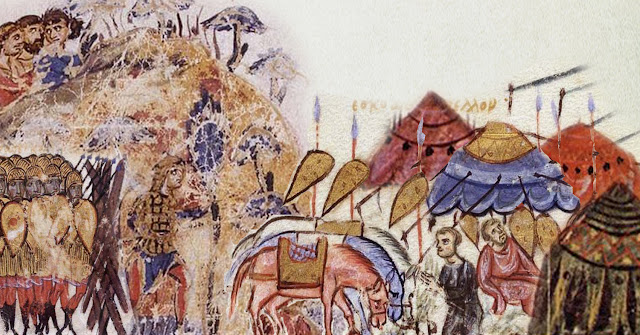Baldr (or Baldur), a Norse god of light and beauty, was loved by almost all of creation, from the divine Æsir all the way to the plants and stones of the earth. As such, when Baldr began to have dreams and premonitions of his own death, the Æsir held a council and decided to make everything in the world swear an oath to never harm Baldr, an oath that most living beings and elements would be more than willing to make.
Sunday, December 24, 2017
Mistletoe, The Killer Of Gods
Labels:
Dark,
Medieval,
Mythology,
Norse,
Religion,
Scandinavia,
Snorri Sturluson
Thursday, December 21, 2017
The Strategy Of The Decoy Camp—Alexios Komnenos Versus Nikephoros Basilakios
In the autumn of 1078, a young general (and future emperor) of the Byzantine Empire by the name of Alexios Komnenos handed a freshly captured rebel leader named Nikephoros Bryennios the Elder over to an agent of Emperor Nikephoros III Botaneiates (r. 1078-1081). In exchange for the prisoner, the agent of the emperor delivered a message for Alexios containing a new task set to him by the crown. Around the same time that Bryennios’ rebellion was crushed, another rebellion had erupted in the city of Dyrrakhion (modern Durrës, Albania), led by Nikephoros Basilakios—Alexios’ task was to hunt down this third Nikephoros (whom we will simply refer to as Basilakios) and put a stop to the rebellion.
Labels:
Alexios Komnenos,
Byzantine,
Greece,
Medieval,
Roman Empire,
War
Thursday, December 7, 2017
The Athenian-Aided Egyptian Rebellion of Inaros Against The Persian Empire
The ancient Egyptians were not happy with their position as a subject nation ruled by Persian overlords. They rebelled during the reigns of Darius I (r. 522-486 BCE) and Xerxes I (r. 486-465 BCE), but were unsuccessful in both of those endeavors. When Xerxes was assassinated in 465 BCE, another leader incited the Egyptian people to once more rebel against Persian rule. This leader was named Inaros, a prince or king of Libyan descent who managed to rally most of Egypt behind him in a massive six-year war against an ancient superpower.
Subscribe to:
Comments (Atom)


